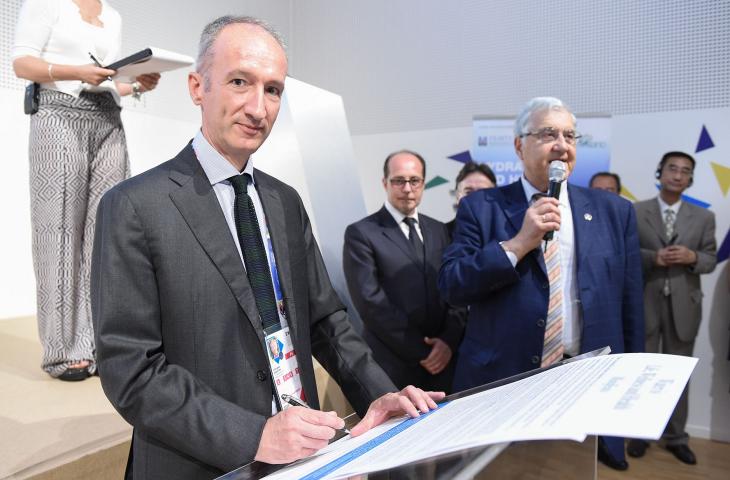Water is
Life, Wellness and Health
Manifesto
Water is essential for our body to function. It helps digestion, absorption of nutrients and elimination of indigestible metabolic wastes, and also facilitates blood circulation. Water carries nutrients and all other substances across our body and regulates body temperature.
Water is essential for human life as physically and biochemically all biological processes need water to occur.
As part of a healthy diet, water ensures proper hydration at any age. Drinking the right amount of quality water is vital considering how important hydration is for people’s health and wellness, cognitive abilities, physical performance and regulation of body temperature.
By removing toxins, water detoxifies our body and makes it stronger, reinforcing its self-healing ability and enhancing health. As a detoxifying agent, water is crucial to prevention and cure.
The World Health Organization (WHO) sees water as a resource that is key to promote health and wellness of individuals and communities around the world. In 1994, the European Commission’s Scientific Committee on Food (Italy’s Daily Reference Intakes -LARN -1996) stated that a healthy diet is to include not only vitamins but also minerals and water in the respective recommended daily intake amounts, to maintain fluid and electrolytes balance. That was the first time dietary reference intakes included water, recognizing its key role in human diet and body functions.
Water is the best fluid for hydrating the human body. This is to be made clear, especially in Western countries where obesity is on the rise and has been associated with high-calorie drinks that often replace water as a source of fluids.
We need to drink often, throughout the day, before we feel thirsty. Thirst is a signal that our body is already low on fluids and on the way to dehydration (i.e. that we don’t have replenished enough fluids).
Even a modest drop in our body’s water supply affects not only our physical condition but also our mental abilities as it can lead to problems such as impaired short-term memory and reduced attention span, difficulties with math, fatigue, reduced psychomotor speed and perceptual decision-making speed. Lack of water in the human body can worsen digestion, increase the likelihood of infections and allergic reactions, cause musculoskeletal pain (trunk pain), headache and generalized joint pain.
Proper hydration is beneficial for …
Kidney function. Drinking enough water is important to prevent a number of diseases, ailments and disorders, such as kidney stones, urinary tract infections and constipation.
Helping to manage non-communicable disease. It is well-established that regular over consumption of sugar-sweetened beverages is linked to increased energy intake, weight gain and obesity in children and adults, as well as an increased risk of developing type 2 diabetes, cardiovascular disease, and gout. Adopting healthy drinking behaviours by switching from sugary-sweetened beverages to healthier beverages such as water, would help to manage non-communicable disease.
Brain function. Dehydration impairs brain efficiency and cognitive process. A drop in water supply by one liter leads to dehydration of brain tissues impacting brain function with effects that are similar to those seen after two and a half months with Alzheimer’s disease.
Immune system function. Regular intake of water increases glucocorticoid and atecholamine levels. It therefore facilitates adaptation to stress and determines modifications in lymphocyte subpopulations, in particular T-suppressor cells, through induced changes in cytokine messages.
Intake of calcium, which is an essential nutrient especially for strong bones. Calcium-rich water is a source of bio-available calcium similar to dairy products.
In the light of the foregoing evidence we call upon all Countries to include adequate hydration as part of a healthy diet among the key priorities for health protection. And to make this an ongoing and long-lasting commitment we invite the leading international organizations, the United Nations and the World Health Organization, to soon adopt a World Hydration Day, to raise awareness of the importance for all people to take and keep the habit of drinking water which is key to ensure the health of future generations.
This Manifesto was prepared on the basis of the Consensus Document “Water & Health. How water protects and improves health overall”
(A FEMTEC initiative with the technical support of the WHO ) and the speeches at the conference “Hydration and Health, the hidden link”,
Milan EXPO 2015, June 11, 2015.











